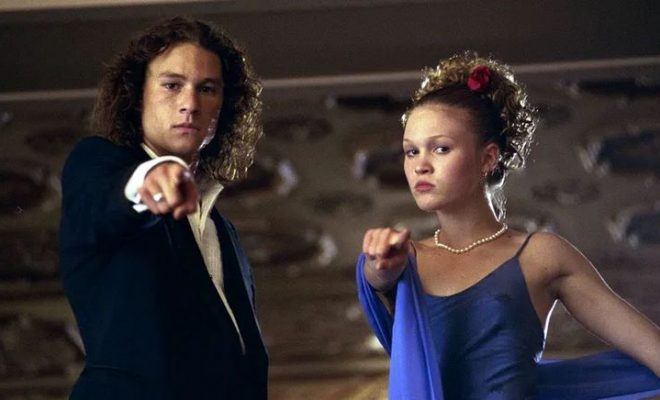Rebels with a cause: how teens on screen grew up and found their voice

The dramatic fuse of Netflix’s Moxie, out this week, will be familiar to anyone with knowledge of Mean Girls, the seminal 2004 teen comedy co-starring Moxie’s director, Amy Poehler. Like Regina George (Rachel McAdams) before her, Poehler’s on-screen daughter Vivian (Hadley Robinson) surreptitiously distributes black-and-white xeroxes of anonymously produced, explosive content in the bathroom before school starts.
But whereas Regina unleashed her Burn Book – a collage of insults, inside jokes and petty humiliations – on to Mean Girls’ suburban high school to detonate social anarchy (and thus, regain Queen Bee control), Vivian’s info drop is far less diabolical, even wholesome. Inspired by her mother’s riot grrrl past, she’s written an anonymous feminist zine, Moxie, with the aim of, if not overthrowing the patriarchy, at least inspiring the female students to reject the mundane (though certainly not benign) sexism of American high school: ranking teen girls’ “bangable-ness”, double-standard dress codes, underappreciation of objectively higher-achieving female athletes.
Mean Girls, written by Tina Fey, remains a highly rewatchable and quotable teen classic, but it’s hard not to read Moxie’s female solidarity against status quo sexism as a rejoinder to the first film’s focus on girl-on-girl crime. Poehler’s film, based on Jennifer Mathieu’s YA book of the same name, is the latest example in a seemingly crestless, streaming-led wave of content about and for teens that riff on the genre’s well-worn staples (the climactic party scene, the scrambling of clique lines, the de-masking of anonymity, missing parents) while revising its more problematic tropes. Unshackled from box office expectations and conventional wisdom, streaming services, with their near-bottomless wells of cash, have made a virtual cottage industry of the once-flatlined teen movie. These films and shows, many written and directed by women and people of color and often arising from young adult fiction’s movement to center marginalized perspectives, are queerer, raunchier, more frank regarding race, identity and sex; like Moxie, they’re less patient and self-referential with sexism, aimed for the more progressive politics of Gen Z, and designed for their personal screens.
In the past five years, teen content has centered protagonists who are neither white (Netflix’s Mindy Kaling series Never Have I Ever, its To All the Boys I’ve Loved Before franchise; Amazon’s Selah and the Spades) nor straight (Love, Simon and its spin-off series Love, Victor; Netflix’s The Half of It). They’ve taken sexual and gender fluidity as a given (HBO Max’s upcoming Generation) and made a trans teenage character half of a central romantic storyline (Emmy-winning hit Euphoria). Some, such as Sex Education and Big Mouth, used foul-mouthed raunch to wheedle into the vulnerable heart, and palpable fear, of adolescent sexuality; others tackled thornier topics – abortion (HBO Max’s Unpregnant), suicide (Netflix’s 13 Reasons Why), drug addiction (HBO’s Euphoria again – if it’s serious or shocking, it’s on Euphoria), and anti-black police brutality (The Hate U Give). Films starring white female protagonists, such as Moxie and Booksmart, have offered a more nuanced understanding of what teen girls actually care about: sex, sometimes; best friendships’ electric, irreplaceable intimacy; for a sizable but limited slice of American high schoolers, getting into a competitive college.
The “teen” genre is admittedly loose, rangy and unclassified – it can span horror (Scream) to sports (Friday Night Lights), Shakespeare (10 Things I Hate About You, O, She’s the Man) to dystopian action (Red Dawn); they can even be aimed for adults, as long as they’re rooted in the adolescent perspective – confused and insecure, yearning, unsure of who one’s about to become.









